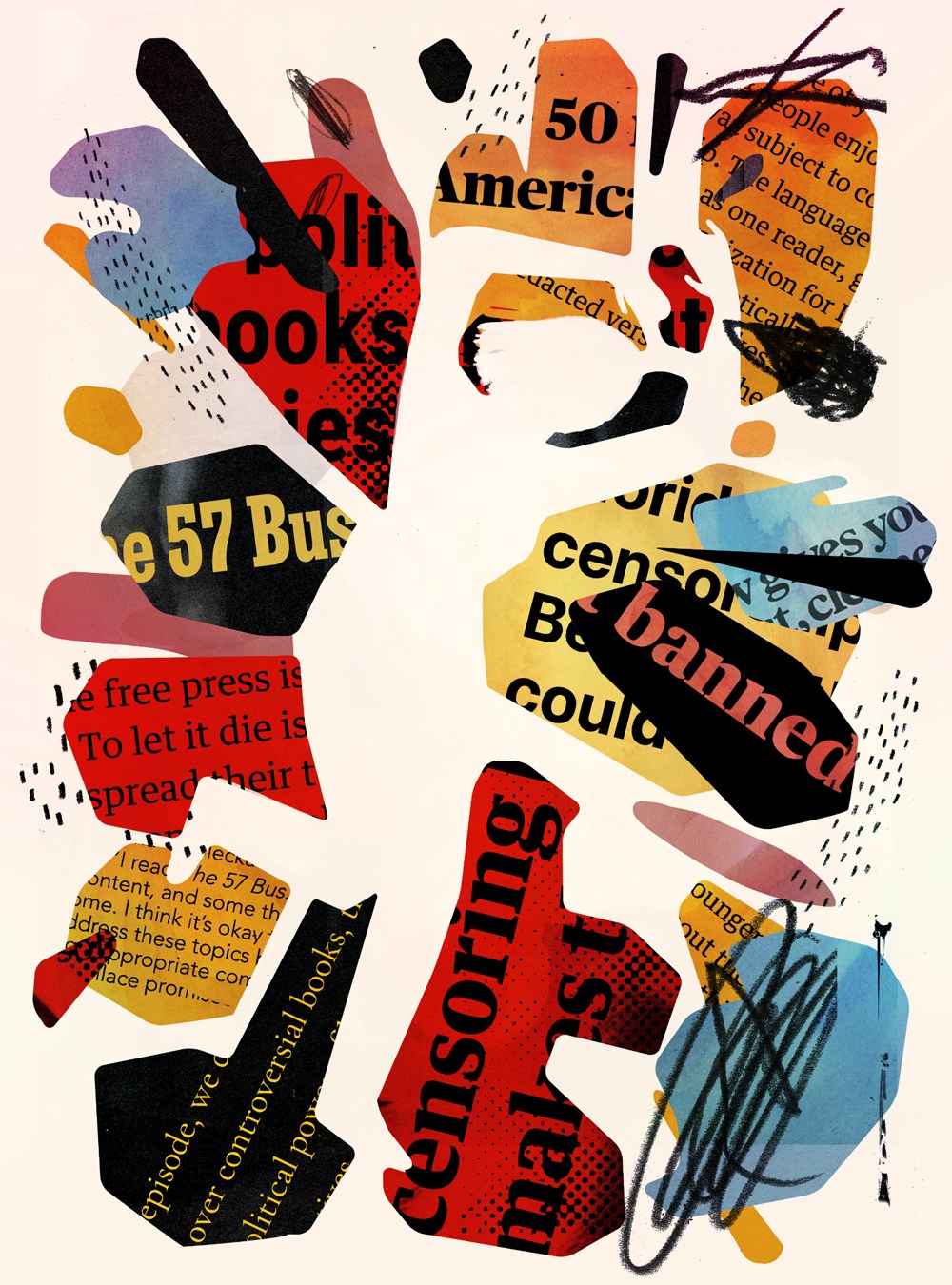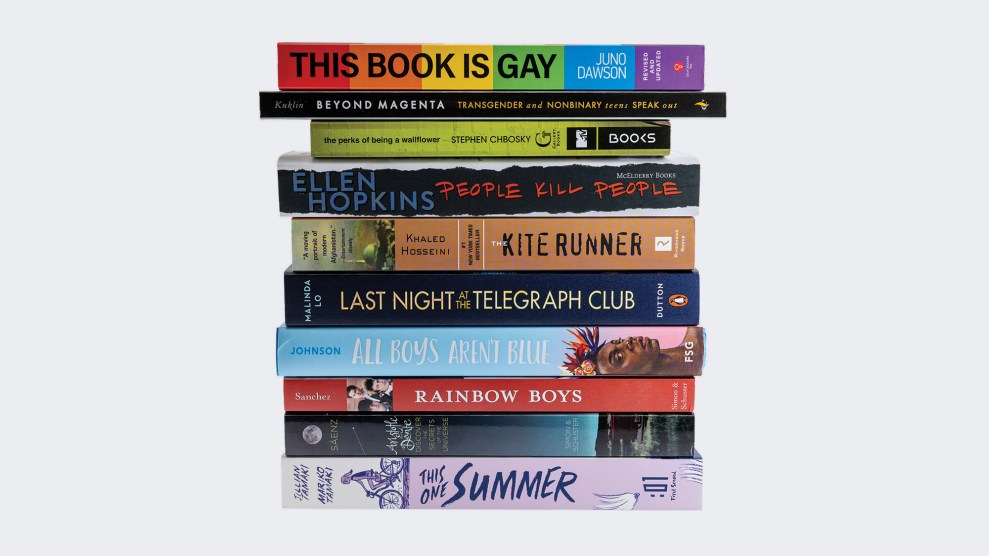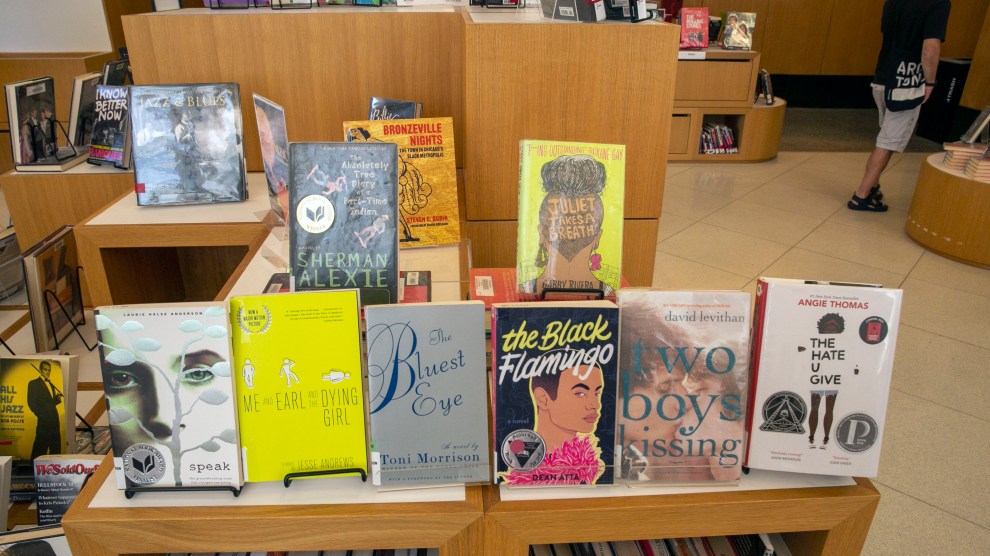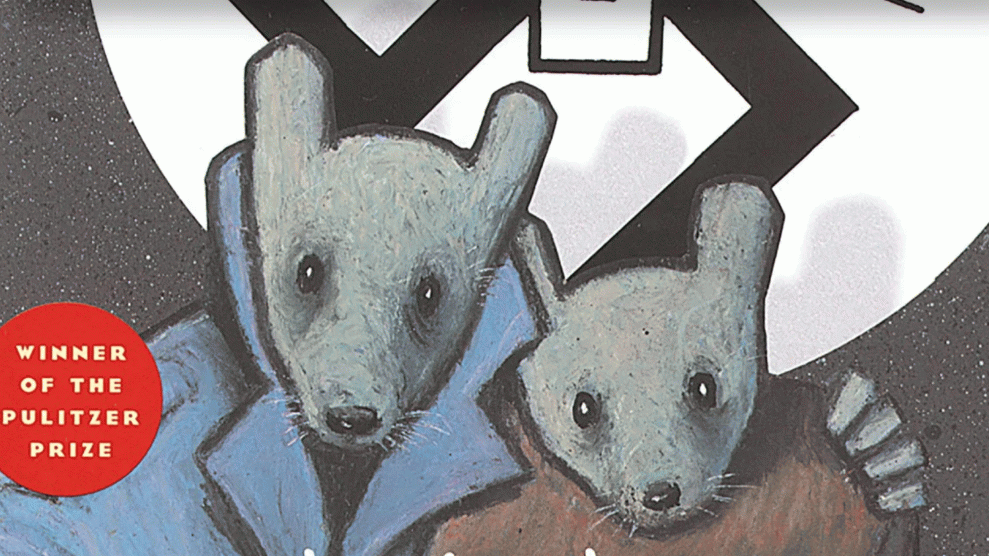Not long ago, I was one of 22 authors honored at a fundraising dinner for my local library. It was a swanky affair, with a multicourse meal, a pair of emcees, and a photographer to capture the rare sight of authors in cocktail attire rather than the sweatpants and baggy T-shirts we tend to favor. Midway through the meal, a waiter placed a full bottle of wine in front of me. “Thanks for giving ’em hell,” he said. “Keep up the good fight.”
An emcee had just announced that my Stonewall Award–winning New York Times bestseller, The 57 Bus, was the 10th most frequently challenged book in Texas and the 35th in the United States last year, a fact that caused the entire room to burst into applause. Bottles of wine are a rare response to such news, but high fives and congratulations are common. Having my book banned is a badge of honor, people often tell me.
I appreciate the sentiment, of course, but it does feel a bit like being congratulated for getting kicked in the teeth by the neighborhood bully. I’m not actually giving the book banners hell, much as I’d like to. I’m receiving hell. We all are: readers, writers, teachers—everyone who cares about the freedom to read.
The American Library Association reports that more than 2,500 books were challenged in 2022, a big uptick from the already astonishing 1,858 challenged in 2021, which was already five times the number challenged in 2019. Last year, some 41 percent of challenged books were by or about LGBTQ people, and 40 percent were by or about people of color. The 57 Bus, a nonfiction narrative about two teenagers on either side of a high-profile crime, is a twofer: One main character is Black, the other nonbinary. The Tennessean reported just last month that The 57 Bus is now one of that state’s top five most challenged books.
Now that many books about race, gender, and sexuality have been cleared from the shelves, the censors are casting an even wider net. According to the latest report from PEN America, an increasing number of challenges target books about violence and abuse, health and wellbeing, and death and grief.
Book bans have been an American pastime since at least the antebellum era, when Southern states forbade the sale of Uncle Tom’s Cabin. In modern times, bans have usually involved lone crusaders targeting a particular title. But this new wave is fundamentally different, driven by groups with strong ties to the Republican Party, such as Independent Women’s Voice, Moms for Liberty, and No Left Turn. Often, a single person affiliated with one group or another presents local authorities with a long list of books they want removed from the shelves—sometimes books they haven’t read and whose names they can’t even bother to get right. One member of Moms for Liberty had 20 Jodi Picoult titles removed from school libraries in Martin County, Florida. Citizen censors even targeted a book by bestselling young adult author John Green for being “depressing.”
State legislators have gotten into the act, too, unleashing an avalanche of bills that make it easier to remove books from libraries and harder to add them. The lawmakers typically insist that they’re not banning books—just “pornography.” But the books themselves tell a different story. “They say there’s porn in schools, and then they ban Dim Sum for Everyone!”observes author Ellen Oh, co-founder of the nonprofit We Need Diverse Books, referring to a picture book by award-winning author-illustrator Grace Lin that was recently banned in Duval County, Florida. “Pretty sure there’s no porn in Dim Sum for Everyone!”
It’s not surprising that the states passing anti-transgender laws are also banning books with queer characters and the states criminalizing abortion are banning books that talk about menstruation and reproductive health. But the challenges aren’t just in red states. They’re happening in school districts in New Jersey, New York, Connecticut, Michigan, Pennsylvania, and my home state of California. Because there’s no central registry of banned books, no one can say with certainty where or how often a given book has been banned, quietly removed from library shelves before any challenge is filed, preemptively stolen by censorship-minded patrons, or just never ordered in the first place. I typically only hear about my own book getting banned when news coverage generates a Google Alert or a librarian emails me with a plea for help.
Yet this particular aspect of the culture wars is accelerating as state legislators introduce ever more extreme bills, some of which actually criminalize the everyday work of librarians. In Missouri, a new law threatens educators and librarians with up to a year in jail and a $2,000 fine for providing minors with “explicit sexual materials.” The legislation already has led to more than 250 books being pulled from the shelves of school libraries, including titles such as Eyewitness Art: Looking at Paintings, The Children’s Bible, and Puberty Is Gross But Also Really Awesome.
In Arkansas, a new law threatens school and community librarians, and teachers, with up to six years in prison and fines of up to $10,000 if they distribute materials deemed obscene or harmful; Indiana, Oklahoma, and Tennessee have similar laws. More than 15 police reports were filed against library staff in Arkansas last year because of the books on their shelves—including The 57 Bus. In Texas, local police have been called to libraries at least five times to investigate “obscene” content, according to the Houston Chronicle, and the Texas Education Agency has opened at least 20 criminal investigations of school districts accused of distributing obscene materials.
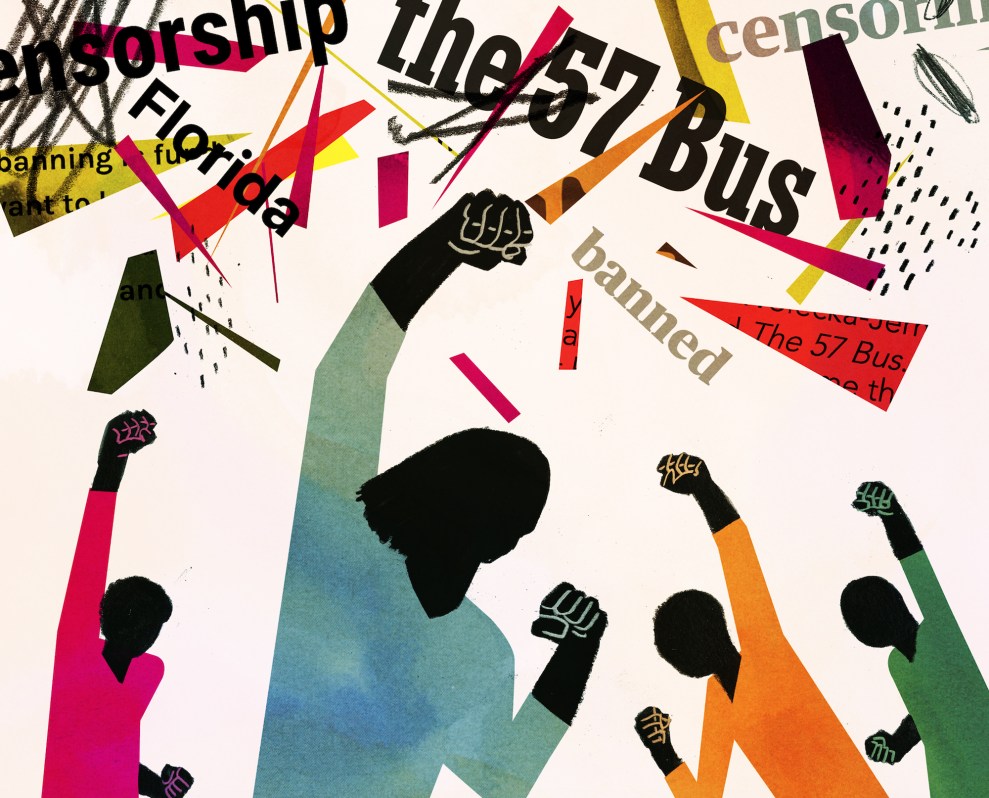
Despite this all-out assault, those of us who write books continue to write them. My latest nonfiction narrative, published in August, was the product of four years of in-depth reporting. Accountable: The True Story of a Racist Social Media Account and the Teenagers Whose Lives It Changed covers the origins and aftermath of an anti-Black Instagram account at a public high school from multiple perspectives: those of the student who created the account; the people who followed it; the kids it targeted; and the parents, teachers, and administrators whose responses often made matters worse.
It’s a curious time to be releasing a book about the ways young people can become both radicalized and victimized online, though the topic couldn’t be timelier, with hate crimes and white nationalism on the rise, the devastating impacts of social media on teenage mental health under scrutiny, and the boundaries between hate speech and free speech being debated vigorously on both the right and the left. I wrote the book precisely because I wanted young people—and the adults in their lives—to have the tools they need to navigate these events when they happen.
But I fear many of the students who would get the most out of my book may not learn that it exists. Never mind that Accountable investigates something that happens at middle and high schools in every corner of the country or that it was meticulously reported and fact-checked or that it contemplates true events from a variety of viewpoints. The simple fact that it deals with racism may be enough to keep it off library and classroom shelves. In the current climate, teachers and librarians can’t help but wonder whether accommodating a “controversial” book is worth the potential blowback, which might include receiving death threats, getting fired, or being labeled a “pedophile” or “groomer.” In a 2022 survey of school librarians by School Library Journal, 97 percent said they had allowed “the effect of controversial subject matter” to influence their purchasing decisions.
While popular wisdom insists that book bans boost sales, that’s really only true for classics like Art Spiegelman’s Maus (banned in Tennessee), not for the roughly 850 other titles under investigation in Texas that have garnered considerably less attention. For children’s and YA authors, schools and libraries are a make-or-break market. Young people are unlikely to have the cash or the inclination to buy banned books themselves. And no student can possibly track every title being kept from them. That’s bad for authors, but also for kids, who are essentially being told the government considers them—their bodies, cultures, families, histories, interests, struggles, and sexualities—unfit for public consumption.
Every author thinks about their readers as they write, and those of us who write for young people probably do so more than most. We have to make our stories comprehensible to readers with limited life experience, for whom decade-old events are ancient history, without being condescending or glossing over complexities. I want my readers to feel challenged, to find themselves having to balance competing values, to have their certainties assailed by counterexamples and their empathy drawn in unexpected directions.
The stacks of letters I’ve received from students around the world tell me that this kind of reading experience is exactly what young people crave. They don’t want to be preached at or lectured to or spoon-fed—they want to be asked to think, to be exposed to new ideas and perspectives. “I hope you can write more books about societal problems in the world, so more people can read these books and change their views, deepen their understanding so that we can fix these problems in society,” one student wrote me recently.
Seven years ago, I authored a piece for this magazine about the lack of diversity in children’s publishing. Things have changed dramatically since then, with books by and about people from diverse backgrounds being produced in record numbers and earning many of the industry’s most prestigious awards. In 2012, 7 percent of children’s books were about people of color. In 2021, it was 33 percent. LGBTQ representation has had a similar surge in visibility.
The children who grew up reading these books, and who learned a more accurate and inclusive history at school, are a force to be reckoned with: empathic, activist, justice-minded, and impatient for change. They also vote in numbers not seen in decades—which probably explains why the same people who are banning books are also trying to curtail voting on college campuses. “Book banners are scared of the kids. That’s the bottom line,” Ellen Oh says.
Oh told me she remains optimistic. The bans are extremely unpopular among liberals and conservatives alike, she points out. But fans of the right to read freely tend not to show up at school board meetings and statehouses the way the book banners do, either because they take their constitutional freedoms for granted or because they’re cowed by the vitriol the censors might throw their way. Without an engaged local press, too, many people are unaware of books being challenged in their backyard. But when readers do show up in force and resist, they can make a big difference.
Consider what happened in Llano County, Texas, this past April. A federal judge had ordered titles on racism and sexual identity returned to the shelves of the county library after deeming their removal a First Amendment violation. In response, the county library board’s far-right members proposed defunding the system entirely—a move reminiscent of the Jim Crow segregationists who filled in public swimming pools rather than integrate them. But after more than 100 Central Texas library supporters showed up at the midweek meeting where the closure vote was to take place, the county commissioners opted to keep the library open.
Such pushback, alas, has been all too rare, which is why we authors are spending our precious writing time speaking out about book bans at conferences, demonstrations, and public meetings; writing op-eds; posting on social media; recording anti-censorship videos; and attending strategy sessions on how best to respond to the growing threat. “All the authors I started fighting [alongside] a year ago are just tired,” says Jonathan Friedman, director of free expression and education programs at PEN America.
I’m tired too. When I get together with other children’s and YA authors, our shoptalk is often about how the bans have affected our careers: the outrageous accusations; the cries for help from embattled parents, teachers, and librarians; the mysteriously canceled speaking engagements; the surreal question of whether it’s even safe for us to do public appearances. “Sometimes, in especially bad situations, I get so upset that I can’t focus on writing, which means that they’re taking away books that haven’t even been written yet,” says Kyle Lukoff, a National Book Award finalist and Newbery honoree whose books featuring trans characters have become frequent censorship targets.
But what choice do we have? Well-placed lawsuits may eventually put an end to clearly unconstitutional censorship laws, but succeeding in court requires time, money, and an unbiased judiciary. For now, we have no choice but to fight where the battle is being waged—at school board meetings and statehouses. And frankly, we need our allies to start showing up. The censors will keep clearing the shelves until the people who believe in readers’ rights start packing hearing rooms, walking precincts in school board elections, and registering their views with school district administrators. “Our side is really good at strongly worded letters and social media rants,” author Phil Bildner tells me. “The other side is showing up, all the time and all over. That’s what we need to be doing, but we’re not. Not like we need to be.”
So hold your applause for the moment and join me on the front lines. Once we’ve won this thing, we can raise a glass to our success. I’ve got a nice bottle of wine chilling in the fridge.
